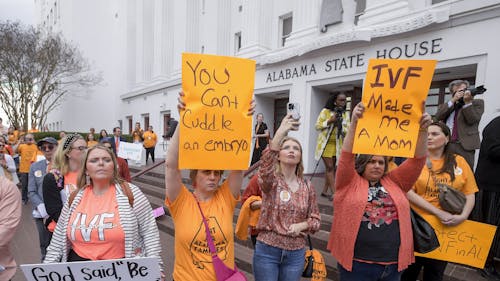TRAN: IVF ruling does not protect, aid families or infants

Approximately 1 in 6 adults worldwide are affected by infertility and, for most of human history, these couples had no choice other than adoption to raise a family. But in the past few decades, multiple artificial reproductive technologies (ARTs) have been created, continuously advancing the field. In fact, the 2010 Nobel Prize in Physiology or Medicine was awarded to Robert Edwards for his role in developing in vitro fertilization (IVF) therapy.
Millions of IVF babies have followed since the first was born in 1978. More than 80,000 babies — or 2.3 percent of infants born in 2021 — were conceived via any kind of ART in the U.S., but that figure reached even as high as 5 percent of the total newborn population in other countries.
Yet, last month, the Alabama Supreme Court made a ruling that halted the state’s IVF clinics. In a lawsuit concerning a clinic's accidental destruction of frozen embryos, the court decided that frozen in vitro 8-cell embryos, which are created 3 days after fertilization on a Petri dish, are unborn children, and as such their destruction results in wrongful death of the parent’s children under an act from the 1800s.
This ruling seems to effectively remove the possibility of IVF treatment under the state’s purview. Each IVF creates multiple embryos, one or two of which are used by the parents, The remainder are frozen, discarded or used for research purposes. The latter two end results would be impossible if the embryos are treated as children.
A simple solution to continue IVF may seem to be just keeping the unused embryos frozen in storage. But this requires power and maintenance, and comes with a cost, which is currently $400-600 per year. So parents would be forced to pay indefinitely if they cannot opt to donate or discard the embryo, and that is obviously not a cheap sum.
But what happens if the parents just avoid paying or are unable to do so? The clinic is not able to get rid of the embryos, or they would be wrongfully killing children, meaning they face ever-accumulating costs.
Adding to that, the clinic is forced to assume the responsibility and risk associated with frozen storage. Any random electrical issue, storm or human accident like the one from the court case means that operating clinics run the risk of facing lawsuit after lawsuit.
These issues are technically manageable: hospitals, for instance, are responsible for many human lives and carry malpractice risks, yet they still operate. IVF clinics could require parents to pay an estimated upfront fee and have insurance for accidents and lawsuits. But this would mean adding an immense cost to IVF, an already expensive procedure that can cost up to $30,000.
And this is for an embryo less than half a week post-conception when it is hardly more than a sperm and egg. This ruling quite simply moves healthcare accessibility in the wrong direction and reverses decades of progress for potential families.
Importantly, infertile couples are not the only ones who benefit from IVF. It enables single or same-sex parents to have children. Older adults can increase their odds of having children when they otherwise would not be able to. In a similar sense, freezing eggs gives people the flexibility to choose to start a family when they feel ready, rather than feeling mounting pressure from the increased risks associated with age.
Disregarding these implications, the court’s ruling should be viewed as absurd in its explicit religious (Christian) basis. The chief justice stated that the ruling "took what was spoken of the prophet Jeremiah and applied it to every unborn person in the state" and that it acts "in accordance with the fear of a holy God."
While some may view the simple ethics and goodness associated with religious beliefs as acceptable to be applied in civil governance, the ruling goes beyond those bounds to reference the Bible multiple times, in one example citing how humans were "made in the image of God, created by Him to reflect His likeness," and so destroying unborn lives "(effaces) his Glory."
Children are taught the separation of church and state in elementary school, but recent rulings clearly ignore that. This decision could easily have been worded to argue that 8-cell embryos are human, and so they cannot be destroyed because killing innocent humans is obviously wrong. As it is, going out of the way to base the ruling on religious beliefs should be seen as completely unacceptable by anyone, regardless of when one believes human life begins.
Some of the issues have been alleviated with the passage of a state law on March 7 that protects clinics from legal liability. Yet this is still just a temporary fix, as admitted by the governor who signed the bill, and IVF providers and families are still hesitant about the long-term implications.
These technologies should be accessible to help as many families as possible, but these kinds of rulings create precedents for more concrete future bans against it, not to mention opening the door for more rulings with similar improper foundations.
Tyler Tran is a sophomore in the School of Arts and Sciences majoring in molecular biology and biochemistry and minoring in medical ethics and health policy, and economics. Tran’s column, “Hung Up” runs on alternate Mondays.
*Columns, cartoons, letters and commentaries do not necessarily reflect the views of the Targum Publishing Company or its staff.
YOUR VOICE | The Daily Targum welcomes submissions from all readers. Letters to the editor must be between 350 and 600 words. Commentaries must be between 600 and 900 words. All authors must include their name, phone number, class year and college affiliation or department to be considered for publication. Please submit via email to oped@dailytargum.com and eic@dailytargum.com to be considered for publication.



